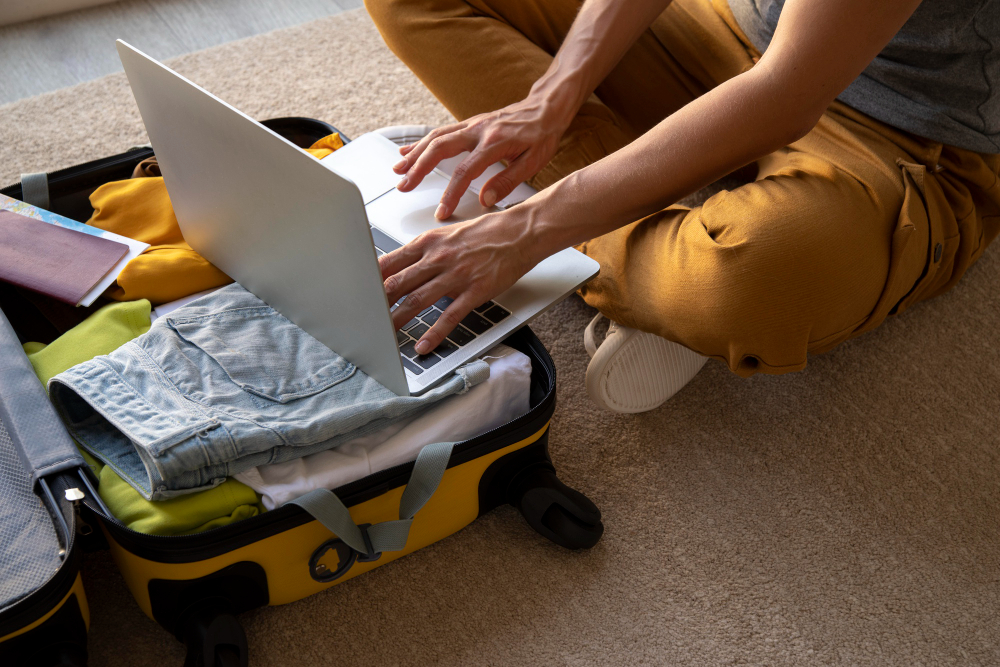Pack Smarter: AI-Powered Lists for Effortless Travel
Technology can be used to make many things in life easier — even the boring task of packing your suitcase.
Use AI to Plan What to Pack for Your Next Trip
Packing is one of the most stressful parts of traveling, no matter how flexible your destination might be.

But what if technology could solve this problem once and for all? In America, travelers are already using AI-generated packing lists to save time, reduce weight, and make sure nothing gets left behind.
The Same Old Problem: What to Bring?
Packing your bags means making a long series of decisions:
How many pairs of socks to take? Should you pack a jacket or buy one at your destination? What about rain gear? Do you need a power adapter?
These and other questions can create a lot of pre-trip anxiety, especially if you already have a long to-do list before departure.
You may also be dealing with a long trip, time zone changes, or visa requirements.
Now imagine having a system that analyzes your destination, weather forecast, length of stay, type of trip, planned activities, and even personal preferences to generate an accurate list of what you really need to bring.
How Do AI-Powered Travel Lists Work?
In the U.S., several platforms and apps — such as PackPoint, TravelWise, and even premium versions of travel assistants like Hopper and TripIt — are integrating artificial intelligence into their services.
These tools can cross-reference data such as weather forecasts, trip duration and accommodations, your travel itinerary, baggage allowances, and traveler characteristics (like gender, age, and user preferences).
With this information, AI creates smart, personalized packing lists.
For example, if you’re spending a week in Austin, Texas during the summer for a music festival and then heading to business meetings in Houston, the tool might suggest lightweight clothes, sunscreen, comfortable shoes, plus formal wear and power adapters.
Practical Benefits for Travelers
- Saves Time and Energy
Planning what to pack can take hours and be mentally exhausting right before your trip.
An automatic, customizable list removes much of the stress, leaving you with just a few details to review and adjust. - Less Weight, Less Stress
AI-powered lists help you avoid overpacking, which can save money on airline baggage fees. Less weight also means easier mobility wherever you’re headed. - Reduces the Risk of Forgetting Essentials
Forgetting a phone charger or important medication can ruin a trip.
Smart lists include detailed checklists and alerts for critical items, factoring in medical needs, extreme weather, or destination-specific requirements. - Real-Time Adaptability
Some platforms now offer dynamic features like live weather updates or event cancellations.
Real-time AI suggestions can update your list accordingly — especially helpful for longer trips with flexible itineraries.
Use Cases in the U.S.
Business Trips with Multiple Stops
Professionals based in cities like Chicago or San Francisco use AI lists to streamline their luggage for corporate travel.
Road Trips and Camping
Travelers road-tripping across the U.S. use AI to account for varying altitudes, lodging types (hotels, campsites, cabins), and survival gear.
Some lists integrate with apps like Roadtrippers, enabling full trip planning.
Integration with Personal Assistants and Devices
In the U.S., these lists often sync with Alexa, Google Assistant, and Siri.
Some AIs even suggest in-the-moment purchases for items you don’t yet own, linking directly to retailers like Amazon or Walmart.
Family Vacations
Parents traveling with small children find AI lists a real lifesaver.
Beyond clothes and toiletries, recommendations include toys, medications, extra documents, and even healthy snack suggestions.
Sustainability and Mindful Consumption
An unexpected benefit is the positive environmental impact.
By optimizing your luggage, you reduce airline fuel consumption — lighter bags mean lighter planes.
Plus, AI lists help consumers avoid impulse purchases and make better use of what they already own.
Data Security and Privacy
Keep in mind that these technologies handle sensitive data.
Always check the privacy settings of the apps you use, especially if they have access to your calendar, location, or contact lists.
The Future: Smarter Bags and Real-Time Tracking
What’s next? Integration with Bluetooth-enabled luggage, weight sensors, and tracking systems.
This would allow AI not only to monitor your bag in real time but also to alert you about overweight risks, potential loss, or even help you pack more efficiently.




